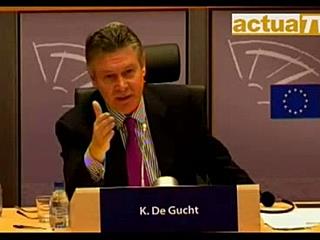by
N. Peter Kramer
De Gucht is displaying considerably greater willingness than his predecessors to confront Beijing. Hosuk Lee-Makiyama of the European Centre for International Political Economy, think-tank in Brussels, fears that the EU approach of ‘fighting fire with fire’ could have unpredictable repercussions.
‘The Commission is shifting towards a confrontationist approach for lack of other effective means to counter what it sees as activist Chinese industry policy’, Hosuk Lee-Makiyama told the Financial Times. Top of the agenda in talks between China and the Commission is a trade dispute over telecommunications equipment that could boil over into a fully fledged trade war. De Gucht has threatened to launch an investigation on his own initiative and not at the behest of an industry complaint! One Commission official made clear to the FT that De Gucht will enter the negotiations with the Chinese ‘with a loaded gun on the table’. On the other hand, a Brussels trade lawyer said, shrugging his shoulders, ‘the Commission has no leverage with China apart from some trade cases, that is why they are trying to scare the Chinese to negotiate on these subsidies’.
The subsidies for Chinese producers come in the form of cheap land, loans and raw materials. Huawei is one of the most critisised Chinese companies, which will surprise nobody knowing that it is the largest "private" technology company in China and one of the largest telecom companies in the world. “Both enough reason for the competition and wretched politicians to create a hostile environment and bad publicity telling stories about partnerships with the Peoples Liberation Army, stealing others technology and having a poor cashflow", says Toine Klok, a former director of the business partner channel of KPN. ’Which self-respecting ICT company doesn't have their national military department as one of their best customers? Isn't involved in a legal battle with the competition about patents? And how important is Huawei's moderate cashflow position when you can count on creditworthy Chinese banks and government and having a revenue in 2011 of USD 32,4 billion and operating margin of 9,1 %. But of course, Huawei isn't a paper tiger; it is a competitor to fear’. Klok added that companies such as Huawei Ericsson, Sony-Ericsson, Nokia, NSN, Qualcomm, Alcatel-Lucent and Nortel for instance have, as competitors, entered into cross licenses.
To succeed in his crusade, the Commissioner for Trade, needs the support of the EU’s 27 member states. Many governments, battling unemployment in times of crises, are more focused on winning contracts and investments from China than a questionable united EU trade policy. During a meeting in September 2012 with British Prime Minister David Cameron Huawei’s CEO Ren Zhengfei announced an investment of GBP 650 million (€750 million) and promised to spend the same amount in procurement in the UK over the next 5 years. Last December Huawei announced it will invest €70 million in an R&D center for new technologies for mobile devices in Helsinki. In January 2013 an investment in Ireland, where Huawei was first established in 2004, was announced. A new R&D center in Cork and Dublin started in the meantime, focussing on Huawei’s next generation Customer Experience Management Product, SmartCare®. The initiative, which will create jobs for over 50 highly-skilled research professionals, is supported by IDA Ireland, the government agency responsible for the development of foreign direct investment in Ireland.
In the FT an EU official said De Gucht enjoys member states’ full backing. Others are less convinced. ‘It is a big gamble for the Commissioner. He started it and now he is against the wall’, according to the trade lawyer.
Trade Commissioner De Gucht on collision course with China
Since his start as European Commissioner for Trade in 2009, Karel de Gucht (a Belgian-Flemish Liberal) has been pushing to stamp out what he believes are illegal Chinese government export-subsidies for their high-tech telecom industry, especially Huawei and ZTE.

To succeed in his crusade, the Commissioner for Trade, needs the support of the EU’s 27 member states. Many governments, battling unemployment in times of crises, are more focused on winning contracts and investments from China than a questionable united EU trade policy. During a meeting in September 2012 with British Prime Minister David Cameron Huawei’s CEO Ren Zhengfei announced an investment of GBP 650 million (€750 million) and promised to spend the same amount in procurement in the UK over the next 5 years. Last December Huawei announced it will invest €70 million in an R&D center for new technologies for mobile devices in Helsinki.



 By: N. Peter Kramer
By: N. Peter Kramer

